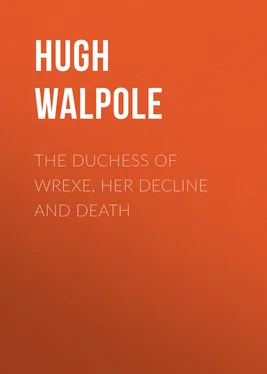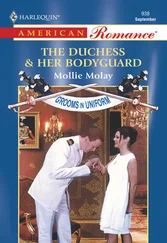Hugh Walpole - The Duchess of Wrexe, Her Decline and Death
Здесь есть возможность читать онлайн «Hugh Walpole - The Duchess of Wrexe, Her Decline and Death» — ознакомительный отрывок электронной книги совершенно бесплатно, а после прочтения отрывка купить полную версию. В некоторых случаях можно слушать аудио, скачать через торрент в формате fb2 и присутствует краткое содержание. Жанр: foreign_prose, История, foreign_edu, foreign_antique, на английском языке. Описание произведения, (предисловие) а так же отзывы посетителей доступны на портале библиотеки ЛибКат.
- Название:The Duchess of Wrexe, Her Decline and Death
- Автор:
- Жанр:
- Год:неизвестен
- ISBN:нет данных
- Рейтинг книги:5 / 5. Голосов: 1
-
Избранное:Добавить в избранное
- Отзывы:
-
Ваша оценка:
- 100
- 1
- 2
- 3
- 4
- 5
The Duchess of Wrexe, Her Decline and Death: краткое содержание, описание и аннотация
Предлагаем к чтению аннотацию, описание, краткое содержание или предисловие (зависит от того, что написал сам автор книги «The Duchess of Wrexe, Her Decline and Death»). Если вы не нашли необходимую информацию о книге — напишите в комментариях, мы постараемся отыскать её.
The Duchess of Wrexe, Her Decline and Death — читать онлайн ознакомительный отрывок
Ниже представлен текст книги, разбитый по страницам. Система сохранения места последней прочитанной страницы, позволяет с удобством читать онлайн бесплатно книгу «The Duchess of Wrexe, Her Decline and Death», без необходимости каждый раз заново искать на чём Вы остановились. Поставьте закладку, и сможете в любой момент перейти на страницу, на которой закончили чтение.
Интервал:
Закладка:
The Long Drawing-room, where they now were, was long and narrow, with two large open fireplaces, a great deal of old furniture rather faded and very handsome, silver that gleamed against the dark wall-paper, one big portrait of the Duchess, painted by Sargent twenty years ago, and high windows shut off now by heavy dark green curtains.
The Duchess, it was understood, did not approve of electric light and the house therefore disdained it. Parts of the room were lighted by candles placed in heavy old silver candlesticks. Round the fireplace at the farther end of the light shone and glittered; there the tea-tables stood, and round about them the company was gathered.
The rest of the room, hung in dark shadow, stretched into black depths, lit only now and again by the gleam of silver or glass as the light of the more distant fire flashed and fell.
The voices, the clatter of the tea-things, these sounds seemed to be echoed by the darker depths of the farther stretches of the room.
Lady Carlos was eighty, extremely vigorous, and believed in bright colours. She was dressed now in purple, and wore a hat with a large white feather. Her figure was bunched into a kind of bundle, so that her waist was too near her bosom and her bosom too near her chin and her chin too near her forehead.
It was as though some spiteful person had pressed all of her too closely together. But this very shapelessness added to her undoubted amiability; her face was fat and smiling, her hair white and untidy, and she maintained her dignity in spite of her figure. Nobody knew anything with certainty as to her income, but she was charitable, and ran a little house in Charles Street with a great deal of ceremony and hospitality. Her husband had long been dead and her two daughters had long been married, so that she was happy and independent. Many people considered her tiresome because her curiosity was insatiable and her discretion open to question, yet she was a staunch Beaminster adherent, an old friend of the Duchess, and saw both this world and the next in the proper Beaminster light.
Lady Adela depended on her a good deal, at certain times: she had forseen that the old lady would come to-day; she had heard of course of Frank Breton's arrival in town, she would demand every detail; Lady Adela knew that the account that she gave to Lady Carloes would be the account that the town would receive.
By the fire Lord Richard, Lord Crewner and the nondescript young man were talking together. Lady Adela caught fragments. "But of course Dilchester is incautious—when was he anything else? What these fellows need–"
That was her brother.
And then Lord Crewner, who believed that the windows of White's and Brook's were the only courts of Ultimate Judgment. "That's all very well, Beaminster, but I assure you, they were saying last night at the club–"
As far as all that was concerned Lady Adela flung it aside. She must attend to Lady Carloes, she must give to her the version of Frank Breton's arrival that her mother would wish her to give. But what was that version? And was her mother really to be depended upon?
At so terrible a flash of disloyalty Lady Adela coloured.—Why were things so difficult this afternoon? And why had she ever gone to that picture-gallery?
Lady Carloes had, however, not yet arrived at Frank Breton. She never paid a visit anywhere without tabulating carefully in her mind the things that she must know before leaving the house. Her theory was that she was really very old indeed, and couldn't possibly live much longer, and that no moment therefore must be wasted. The more news that she could give and receive before her ultimate departure, the more value would her life have in retrospect.
She never went definitely into the exact worth that all the gossip that she collected might have for anybody or anything; as with any other collection it was pursuit rather than acquisition that fired the blood. At the back of her old mind was a perfect lumber-room of muddle and confusion—dusty gossip, cobwebs of scandal, windows thick with grime and tightly closed. There was no time left now to do anything to that. Meanwhile every day something was purchased or exchanged; muddle there might be, but, thank God, nobody knew it.
"You must be very busy about the ball, my dear."
"Yes—it means a great deal of work. It's so long since we've had anything here, but Norris is invaluable. You don't find servants like that nowadays."
"No, my dear, you don't. But, of course, it will go off splendidly. We're all so anxious that Rachel shall have a good time. It's the least we can do for your mother."
At the mention of Rachel Lady Adela's thoughts straightened for a second; that was where the confusion lay. It had been Rachel's attitude to the portrait that had caused Lady Adela's own momentary disloyalty. Of course Rachel hated her grandmother. Lady Adela made a little sound with her fingers, a sound like the clicking of needles.
"As far as Rachel is concerned nobody can tell possibly how she's going to take it all. I don't pretend to understand her."
Lady Carloes found this interesting—she bent forward a little. "We're all greatly excited about her. You've kept her away from all of us and one hears such different accounts of her. And of course her success is most important—as things are just now."
Lady Adela answered, "I can tell you nothing. She isn't in the least like any of us, and I don't suppose for a moment that she'll listen to anybody. She made a friend of May Eversley in Munich, and I don't think that was the best thing for her. But you know—I've talked about this to you before."
Not only had Lady Adela talked; all of them had done so. In the Beaminster camp this appearance that Rachel was about to make was of the last importance. There were enemies, redoubtable enemies, in the field. Rachel Beaminster's bow to the world was for the very reason that all the world was watching, a responsibility for them all.
But there were many rumours. Rachel was not to be relied upon—she hated her grandmother, she was strange and foreign and morose. Lady Carloes was not happy about it, and Lady Adela's attitude now was anything but reassuring.
John Beaminster came in. Lady Carloes liked him because he was good-tempered and injudicious. He told her a number of things that nobody else ever told her, and he had so simple a mind that extracting news from it was as easy as taking plums from a pudding. He did not come over to them at once, but stood laughing with Lord Crewner and his brother. He would come, however, in a moment, so Lady Carloes made a last hurried plunge at her friend.
"What's this I hear, my dear, about Frank Breton?"
"Yes, it's perfectly true. He's come back, and has taken rooms quite near here. He wrote to mother–"
Lady Carloes took this in with a gulp of delight. "My dear Adela! What did he say?"
"Oh! a very rude letter. He told mother that he knew that she would like him to be near at hand and that they ought to let bygones be bygones, and that he was sure that she would be glad to hear that he was a reformed character. Of course he hates all of us."
"What will you all do?"
"Oh! Nothing, of course. We gave him up long ago. By a tiresome coincidence he's taken rooms in the same house as my secretary, Miss Rand. I would send her away if she weren't simply invaluable. But it gives him a kind of a link with us."
"Monty Carfax saw him yesterday. He's lost his left arm, Monty says, and looks more of an adventurer than ever. So tiresome for your mother, my dear."
Then, as Lord John began to break away from the group at the fireplace and move towards them–
"Roddy Seddon told me he might look in this afternoon.... Your mother's so devoted to him. He seems to understand her so well."
Читать дальшеИнтервал:
Закладка:
Похожие книги на «The Duchess of Wrexe, Her Decline and Death»
Представляем Вашему вниманию похожие книги на «The Duchess of Wrexe, Her Decline and Death» списком для выбора. Мы отобрали схожую по названию и смыслу литературу в надежде предоставить читателям больше вариантов отыскать новые, интересные, ещё непрочитанные произведения.
Обсуждение, отзывы о книге «The Duchess of Wrexe, Her Decline and Death» и просто собственные мнения читателей. Оставьте ваши комментарии, напишите, что Вы думаете о произведении, его смысле или главных героях. Укажите что конкретно понравилось, а что нет, и почему Вы так считаете.












